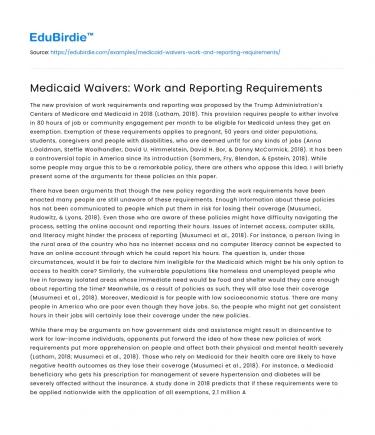The new provision of work requirements and reporting was proposed by the Trump Administration’s Centers of Medicare and Medicaid in 2018 (Latham, 2018). This provision requires people to either involve in 80 hours of job or community engagement per month to be eligible for Medicaid unless they get an exemption. Exemption of these requirements applies to pregnant, 50 years and older populations, students, caregivers and people with disabilities, who are deemed unfit for any kinds of jobs (Anna L.Goldman, Steffie Woolhandler, David U. Himmelstein, David H. Bor, & Danny McCormick, 2018). It has been a controversial topic in America since its introduction (Sommers, Fry, Blendon, & Epstein, 2018). While some people may argue this to be a remarkable policy, there are others who oppose this idea. I will briefly present some of the arguments for these policies on this paper.
There have been arguments that though the new policy regarding the work requirements have been enacted many people are still unaware of these requirements. Enough information about these policies has not been communicated to people which put them in risk for losing their coverage (Musumeci, Rudowitz, & Lyons, 2018). Even those who are aware of these policies might have difficulty navigating the process, setting the online account and reporting their hours. Issues of internet access, computer skills, and literacy might hinder the process of reporting (Musumeci et al., 2018). For instance, a person living in the rural area of the country who has no internet access and no computer literacy cannot be expected to have an online account through which he could report his hours. The question is, under those circumstances, would it be fair to declare him ineligible for the Medicaid which might be his only option to access to health care? Similarly, the vulnerable populations like homeless and unemployed people who live in faraway isolated areas whose immediate need would be food and shelter would they care enough about reporting the time? Meanwhile, as a result of policies as such, they will also lose their coverage (Musumeci et al., 2018). Moreover, Medicaid is for people with low socioeconomic status. There are many people in America who are poor even though they have jobs. So, the people who might not get consistent hours in their jobs will certainly lose their coverage under the new policies.
Save your time!
We can take care of your essay
- Proper editing and formatting
- Free revision, title page, and bibliography
- Flexible prices and money-back guarantee
While there may be arguments on how government aids and assistance might result in disincentive to work for low-income individuals, opponents put forward the idea of how these new policies of work requirements put more apprehension on people and affect both their physical and mental health severely (Latham, 2018; Musumeci et al., 2018). Those who rely on Medicaid for their health care are likely to have negative health outcomes as they lose their coverage (Musumeci et al., 2018). For instance, a Medicaid beneficiary who gets his prescription for management of severe hypertension and diabetes will be severely affected without the insurance. A study done in 2018 predicts that if these requirements were to be applied nationwide with the application of all exemptions, 2.1 million Americans could be at risk for losing their coverage soon (A. L. Goldman, S. Woolhandler, D. U. Himmelstein, D. H. Bor, & D. McCormick, 2018). Just when many people have been benefitted by the expansion of Medicaid coverage under ACA, these requirements will leave a huge chunk of Americans insured (Center on Budget and Policy Priorities, 2018). Undoubtedly, this would impose negative health outcomes for many people.
When we are trying to defeat chronic diseases and other health problems through the medical miracles and innovations, government policies like this would push back the victory America has been trying to make in the health sector. I can only think of health being a privilege rather than right in a situation like this. Those who are already in bad shape due to economy, disabilities and limited health care will possibly be in worst shape after these requirements. On the brighter side, arguments on how work requirements can give Medicaid beneficiaries a sense of dignity and responsibility towards the community have been proposed (Chougule, 2018; Rosenbaum, 2018). Amidst the brighter and darker sides of these work and reporting requirements, I personally feel risks outweigh the benefits in this case. Hence, before implementing any new policies, the people in power should study analyze the multiple facets of the issues so that most people get benefitted by any new policies.






 Stuck on your essay?
Stuck on your essay?

